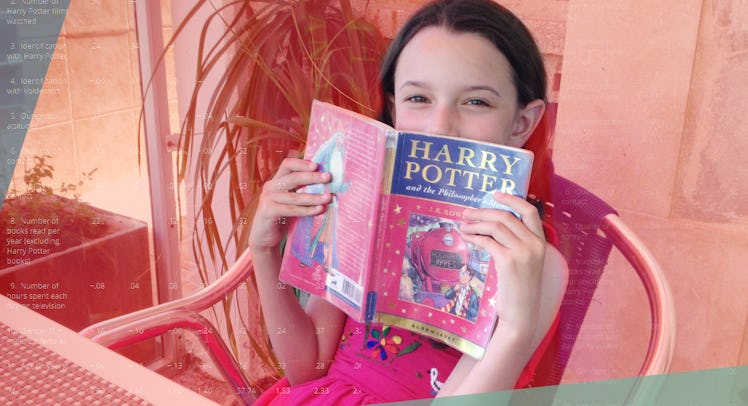‘Harry Potter’ Books Will Make Kids Better People, Study Shows
Researchers say a lot of books could make children more tolerant people.

Buying your kids Harry Potter books as holiday gifts may help make them a better person, according to research out of Modena, Italy. A series of three studies found that the more children connected to positive characters such as Harry, the less likely they were to display prejudices toward ethnic groups different from their own. Likewise, the same effect was observed in adolescents and adults relative to how many of J.K. Rowling’s books they read.
“Simply presenting positive information about stigmatized groups may not be sufficient,” study coauthor Loris Vezzali, a social psychologist at the University of Modena and Reggio Emilia, told Fatherly. “Individuals have to feel involved and ‘imitate’ actions of characters with whom they can identify.”
Research shows that reading early has the capacity to changes children’s brains for the better, but that’s been thought to mostly be related to language and literacy development. Other academics have argued that Harry Potter books specifically have the capacity to cause social change. Likewise, past studies show how stories written by academics for the sole purpose of an experiment may impact children, but few have tested how mainstream literature widely consumed by both kids and families figures into this.
The study, published in the Journal of Applied Psychology, first surveyed a group of 34 fifth-graders about their attitudes towards immigrants. Then once a week for six consecutive weeks, researchers read kids specifically selected passages from Harry Potter that dealt issues of prejudice and their consequences. When kids, were surveyed again, both about their views on immigrants and their views on the stories, children who identified with protagonists like Harry and disidentified with villains like Voldemort, the more their attitudes towards out-groups improved.
Researchers then conducted a follow-up experiment that surveyed how 117 high school students felt about Harry Potter books (and films) and their general social attitudes, as well as their specific views regarding homosexuals. Results revealed that consuming Harry Potter stories were associated with improved attitudes towards homosexuals and other stigmatized groups. Finally, Vezzali and his colleagues looked at another group of 75 undergraduate students. After completing questionnaires on how much Harry Potter they read and watched, along with what characters they identified with and their feeling son refugees, results showed that reading Harry Potter books was positively associated with understanding the perspectives of refugees, especially among those who identified with positive characters.
“A possible caveat is that elves, goblins, etc. — that is, the stigmatized characters in the books, do not exist in the real world,” Vezzali notes. However, this is an advantage fantasy books like the Harry Potter series bring to the table. Simply, because these categories do not exist, they become more general examples of real stigmatized categories for readers of all ages. As a result, “people can associate them with several types of stigmatized groups in the society.”
Vezzali says that there are many other literature options other than Harry Potter books that accomplish the same tolerance gains. The issue for researchers is that it’s difficult to test the impact of more obscure stories that may not be read by broad samples of people. Currently, Vezzali is researching how the Hunger Games books and movies help adolescents identify and address social injustices.
For parents, the takeaways are not just to expose children to Harry Potter books. Rather, any media that shows them how people from different worlds can be friends can teach kids tolerance. Still, Vezzali is careful to point out that books alone won’t make kids better people. The best way to accomplish this is through exposing children to different ethnic groups and cultural experiences throughout life, he’s confirmed through two additional follow up studies more recently.
In the end, to cast Harry Potter as a magical solution would be all too easy, Vezzali says. “Harry Potter can be a good tool, but alone it too can’t erase prejudice from the society.”